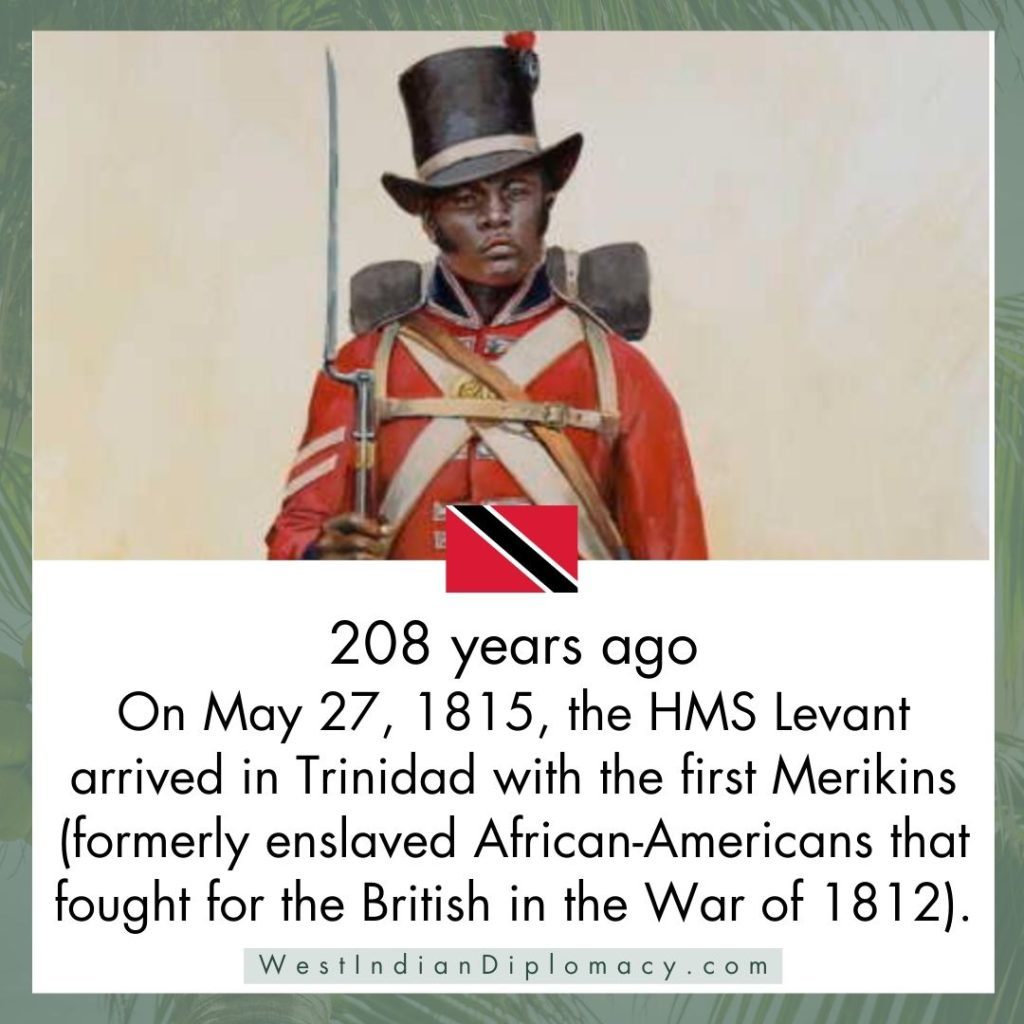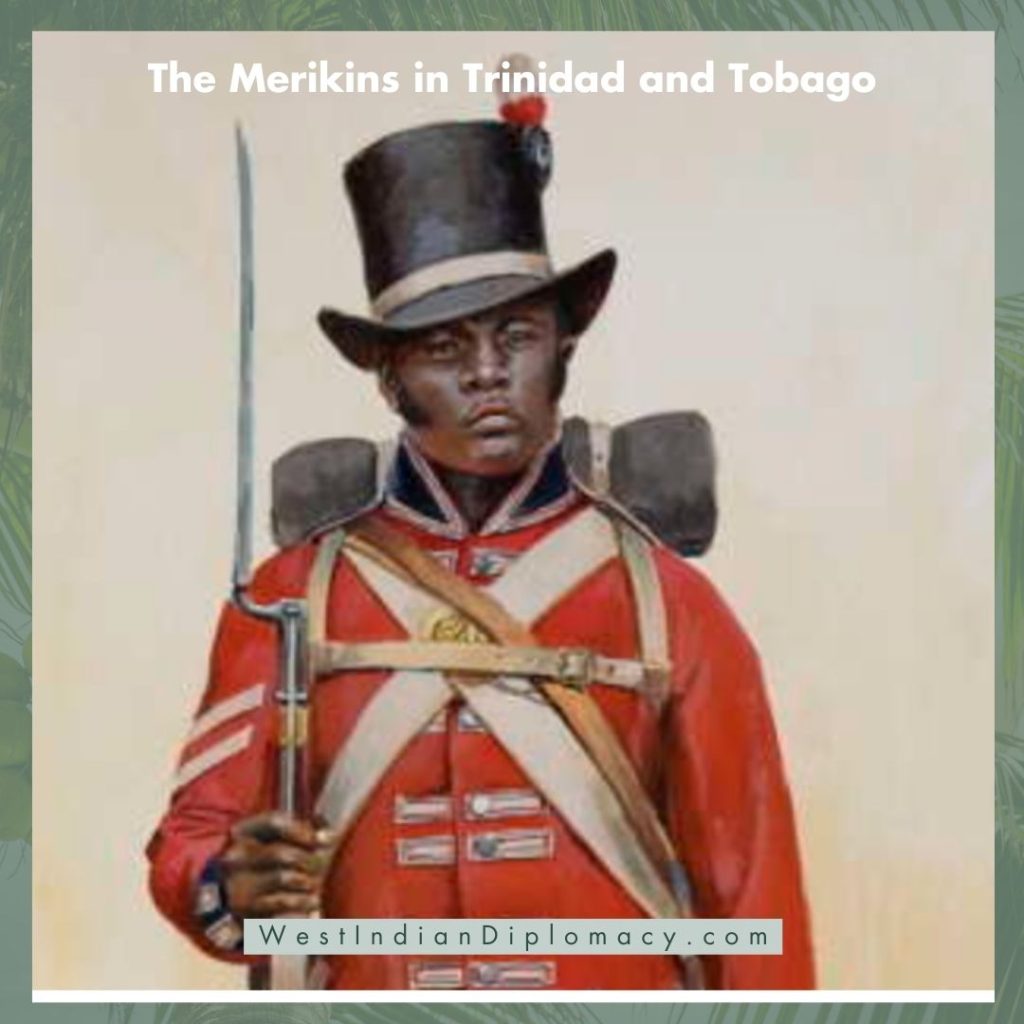The Merikins in Trinidad and Tobago
This article is about the Merikins in Trinidad and Tobago.

Among its many cultural communities, the Merikins stand out as a unique group with a fascinating history and enduring cultural legacy. Trinidad and Tobago, a vibrant Caribbean nation, is known for its rich cultural tapestry shaped by diverse influences.
Historical Background:
The term "Merikin" refers to descendants of African Americans who were freed from slavery in the United States and resettled in Trinidad after the War of 1812. These freedmen, known as Merikins or Merikens (derived from "Americans"), arrived in Trinidad in 1815-1821. They fought on behalf of the British and were promised land and opportunities for self-governance by the British colonial authorities.
They arrived in Trinidad as free men while slavery was still practiced in the country.
Settlement and Heritage:
The Merikins settled in the areas of Laventille, Caroni, and Naparima in Trinidad. They brought with them their own cultural practices, language, and traditions. Their unique heritage was a fusion of African, American, and Afro-Caribbean influences, which set them apart from other African descendant communities in Trinidad.
Language and Culture:
The Merikins developed a distinct Creole language known as Merikin English or Merikin Talk, which blended elements of African American English with local Trinidadian dialects. This language, although now endangered, is an important marker of their cultural identity.
Traditional Practices and Festivals:
The Merikins in Trinidad and Tobago have preserved several traditional practices that are still observed today. These include the "John Canoe" (Jonkonnu) festivities during Christmas and Boxing Day, which feature vibrant processions, dance performances, and music. The John Canoe tradition showcases the resilience, creativity, and cultural fusion of the Merikin community.
Architecture and Heritage Sites:
The Merikin villages are characterized by their unique architecture, featuring raised wooden houses with wrap-around verandas. These architectural styles have become iconic representations of Merikin heritage and can still be seen in certain parts of the country.
Cultural Preservation and Awareness:
Efforts have been made to preserve and promote Merikin heritage in Trinidad. The National Archives of Trinidad and Tobago, alongside local organizations, have conducted research and documentation projects to safeguard the history, language, and traditions of the Merikin community.
Conclusion:
The Merikins in Trinidad & Tobago represent a remarkable chapter in the country's history. Their arrival, settlement, and preservation of their unique cultural practices have contributed to the diverse cultural mosaic of Trinidad and Tobago.
Celebrating the Merikin heritage not only honors their contributions but also enriches the nation's cultural identity. Through continued efforts to preserve their language, traditions, and historic sites, the Merikins' legacy will endure for future generations to appreciate and admire.
Main Reference
https://natt.gov.tt/sites/default/files/pdfs/Celebrating-the-Merikins.pdf

This article was about the Merikins in Trinidad and Tobago.
By Melissa Ramnauth, Esq. | This content is copyright of West Indian Diplomacy, LLC and may not be reproduced without permission.

She runs West Indian Diplomacy, a Caribbean blog aimed at promoting West Indian history and business in the global marketplace. Melissa has been an attorney for over 10 years. She currently focuses on trademark registration, trademark searches, and office actions. She also has extensive legal experience in the areas of trademarks, copyrights, contracts, and business formations. She owns her own Trademark Law Firm that is virtually based out of Fort Lauderdale.
Please Sign Our
Petition to Preserve Our Ship Records
By Submitting this Form
Book Recommendations
The First East Indians to Trinidad: Captain Cubitt Sparkhall Rundle and the Fatel Rozack
History of the People of Trinidad and Tobago
An Introduction to the History of Trinidad and Tobago
Disclaimer: This post is for informational purposes only and does not constitute legal advice. Please see our Terms & Conditions and Privacy Policy for more information regarding use of this site. All information is true and accurate to the best of our knowledge. The information on West Indian Diplomacy is “as is.” We make no representations or warranties, express or implied, with respect to the content provided on this website or on any third-party website which may be accessed by a link from this Web site, including any representations or warranties as to accuracy, timeliness, or completeness. West Indian Diplomacy will not be liable for any losses, injuries, or damages from the display or use of this information.